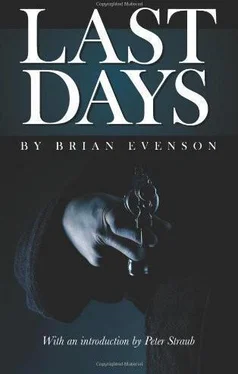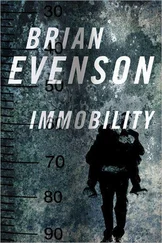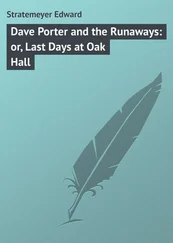Or was it the moment, one floor down, when he opened a door and saw a man missing various digits and limbs, a ten or an eleven, and showed him Borchert's head and then, instead of killing the man right away, spent some time positioning Borchert's head on the floor so that it was looking at the man, so that it would have to see what came next? That next being Kline groping the cleaver out of his belt and advancing forward with the cleaver raised as the man began to give hoarse cries and beg inarticulately for mercy.

By the time he opened the last door on the bottom floor of the building, by the time he had killed several dozen mutilates with the cleaver, he was figuring out ways to pretend to be human again. He was thinking of the money in the briefcase, what he might do with it once everyone else in the world was dead. He was thinking of Paul, of the Pauls, wondering whether Borchert had been right after all. He was considering what he would have to do next. Beneath these thoughts he could feel the writhing motion of the limbs and torsos and heads trying to scuttle away from him-here, the rising of a bloody head, there the shock and rapid seep of an open and fresh wound filling with blood, a bluish-white fist of bone torn from its socket, the reduction of bodies to spongy meat and slicks of blood and shattered, drying bone. How many? he wondered, and found himself unable to count them out, nor even quite able to grasp how he had moved from room to room: left with little beyond the act of positioning Borchert's head and then lifting the cleaver high, all of it starting to overlap with the other instances when he had raised a cleaver and brought it down upon himself. And this, indeed, was the most terrible thing of all: each blow he sunk into an arm or a leg or a chest or a head-each of these blows in any case which he could remember-he had felt going into his own body as well.
"Almost over," he said to Borchert's head, "almost done," and then wondered idly when the head would start to talk back.
He opened the front door. It was still dark outside, the night cloudless and with no moon, the stars bright. The guard was still there, his body lying beside the fence, still motionless but breathing, still staring into the air. Kline stepped gingerly around him.
He followed the path back to the rest of the complex, moving cautiously until he was among the larger houses. Once he nearly crossed paths with a guard and was forced to press himself between some bushes and a house's wall until the man had passed. But quickly he was following Borchert's directions again, and soon was standing outside Ramse's door.
He tried the door and found it locked. There was a stained glass panel on the top portion of the door and he broke it out with Borchert's head, sweeping the glass off the casement with the side of Borchert's face. He pushed the head in and heard it thump softly on the floor. He managed to steady himself on the edge of the doorframe enough to get one foot up and onto the doorhandle, and then grabbed the edge of the broken panel and pulled himself up, and then reached in deep through the panel and managed to unlock the door. A moment later he was inside.
He turned on the bedside lamp then stood beside the bed, watching Ramse sleep. He seemed peaceful, serene, his face as pale and motionless as if made of wax. It was almost a shame to wake him.
He balanced Borchert's head on the nightstand, facing away from the bed. Tugging the cleaver from his belt, he sat down on the edge of the mattress.
"Ramse," he said, "Wake up."
Ramse's face scrunched, going from wax to flesh then back again. His eyes fluttered a little then opened, remaining unfocused but slowly coming together on Kline's face. At first they just stared, and then a dull sluggish fear began to build behind them.
"It's all right, Ramse," said Kline. "It's me, Kline." More or less , he thought.
"That's what I'm afraid of," said Ramse, voice still hoarse with sleep.
"No reason to be afraid," said Kline.
"What happened to you?" asked Ramse. "Are you dead?"
Kline looked down, saw his blood-soaked chest. "Nothing happened to me," he said. "I'm what happened to them."
"What's that supposed to mean?" asked Ramse, voice rising, and Kline gestured to the bedside table.
"There's part of it," Kline said.
Ramse turned and saw the back of Borchert's head. He tried to speak but it came out in a shriek. Kline lifted his cleaver and shook his head and Ramse stopped. He looked back to the head, swallowed hard.
"Is it Gous?" he said, and looked like he was going to cry.
"Of course not," said Kline. "It's Borchert."
"I don't believe you," said Ramse.
Kline sighed. He put the cleaver down on the bed, reached over to turn the head to face Ramse.
"Believe me now?" he asked.
Ramse just nodded.
"I just wanted to make you au courant ," said Kline. "To summarize: I slaughtered the guards at the gate. Then I killed everyone in the stone building that Borchert is in. Or rather was in. Which makes you next to run things, no?"
"Me or DeNardo," said Ramse. "Are you planning to kill us?"
"I don't want to kill you," said Kline. "DeNardo's a nine too?"
Ramse nodded.
"Only two nines?"
"No," said Ramse. "There are four of us. The other two won't be chosen."
"Why not?"
"It's complicated," said Ramse. He was starting to calm down a little. "Let's just say one isn't interested, the other has made too many enemies."
"Should I kill DeNardo?"
"What?" asked Ramse.
"Are you certain you can beat him?"
"Almost certain."
"You have to be certain," said Kline.
He watched Ramse think, turning it slowly over in his head.
"I can leave Borchert's head with you if you think that'll help," said Kline.
Ramse, looking terrified, shook his own head. "It wouldn't help," he said.
"Fine," Kline said. "Borchert is coming with me then."
"I'm certain," Ramse finally said.
"All right," said Kline. "Good. Now listen very carefully," he said. "If I'm to let you live, I need a promise from you."
"What is it?"
"I want to be left alone," said Kline. "I never want to see any of you ever again."
"Of course I'm going to say yes," said Ramse. "But how can you believe me?"
"Look around you, Ramse," said Kline. "Go outside and look and tally up the number of the dead. And then think about how many there are and about the fact that none of them are me. The only thing they all wanted was for me to be dead and I'm the only one of them still alive."
Ramse swallowed, nodded.
"Wouldn't you rather have a truce?"
"Again," said Ramse, using his stumps to push himself a little higher in the bed, "how can I say anything but yes?"
Kline smiled thinly, feeling the dried blood around his mouth crack. "There's always Gous," he said.
"What about Gous?" said Ramse.
"You break your promise and I'll kill Gous. I'll send him to you bit by bit."
"What do I care about Gous?" asked Ramse.
"You had a falling out," said Kline. "But what's a little thing like religion between old friends? Besides, he's coming back into the fold."
"He told you that?"
"He doesn't know it yet," said Kline. "But he will."
"How would you know? What are you, some kind of prophet?" asked Ramse.
"I'm beginning to wonder," said Kline. "Now which is it?" he asked. "Truce or war?"
Ramse stared at him for a long moment. "Truce," he finally said, and stuck out his stump.
"Good enough for me," Kline said, touching it with his own stump. Sticking the cleaver back in his belt and taking the head by its remaining hair, he made for the door.
Читать дальше













